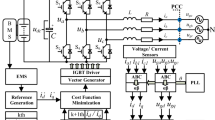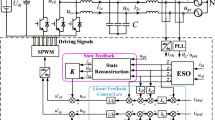Abstract
This paper suggests an observer based control approach for fully active hybrid energy storage system (HESS) comprising of two storage elements such as supercapacitor (SC) and battery, two bidirectional DC–DC converters and variable load. In order to formulate a control approach for this hybrid system, the unmeasured dynamics of the system must be available. This engenders the design of a robust exponential state observer in this paper to estimate various unknown system variables such as load, battery and SC currents/voltages. Furthermore, this paper also renders an integral terminal sliding mode control (ITSMC) concatenated with Proportional Integral (PI) based Lyapunov’s function technique to robustly track the reference battery current, SC current and load voltage in finite time in the presence of lumped system uncertainties. The robustness, stability and finite time convergence properties of the closed loop system with the proposed technique are demonstrated through analytical approach. Simulated results are validated with the proposed methodology through various case studies and compared with LMI (linear matrix inequalities) based robust control techniques presented in literature.







Similar content being viewed by others
References
Aneke M and Wang M 2016 Energy storage technologies and real life applications–A state of the art review. Appl. Energy 179: 350–377
Wang Y, Liu C, Pan R and Chen Z 2017 Modeling and state-of-charge prediction of lithium-ion battery and ultracapacitor hybrids with a co-estimator. Energy 121: 739–750
Manandhar U, Tummuru N R, Kollimalla S K, Ukil A, Beng G H and Chaudhari K 2017 Validation of faster joint control strategy for battery-and supercapacitor-based energy storage system. IEEE Trans. Ind. Elect. 65(4): 3286–3295
Zhang L, Hu X, Wang Z, Sun F and Dorrell D G 2018 A review of supercapacitor modeling, estimation, and applications: A control/management perspective. Renew. Sustain. Energy Rev. 81: 1868–1878
Jung H, Wang H and Hu T 2014 Control design for robust tracking and smooth transition in power systems with battery/supercapacitor hybrid energy storage devices. J. Power Sour. 267: 566–575
Li W, Joós G and Bélanger J 2009 Real-time simulation of a wind turbine generator coupled with a battery supercapacitor energy storage system. IEEE Trans. Ind. Elect. 57(4): 1137–1145
Li J, Xiong R, Yang Q, Liang F, Zhang M and Yuan W 2017 Design/test of a hybrid energy storage system for primary frequency control using a dynamic droop method in an isolated microgrid power system. Appl. Energy 201: 257–269
Camara M B, Gualous H, Gustin F and Berthon A 2008 Design and new control of DC/DC converters to share energy between supercapacitors and batteries in hybrid vehicles. IEEE Trans. Veh. Technol. 57(5): 2721–2735
Gao L, Dougal R A and Liu S 2005 Power enhancement of an actively controlled battery/ultracapacitor hybrid. IEEE Trans. Power Elect. 20(1): 236–243
Trovão J P, Silva M A, Antunes C H and Dubois M R 2017 Stability enhancement of the motor drive DC input voltage of an electric vehicle using on-board hybrid energy storage systems. Appl. Energy 205: 244–259
Incremona G P, Cucuzzella M, Magni L and Ferrara A 2017 MPC with sliding mode control for the energy management system of microgrids. IFAC-PapersOnLine 50(1): 7397–7402
Song Z, Hou J, Hofmann H, Li J and Ouyang M 2017 Sliding-mode and Lyapunov function-based control for battery/supercapacitor hybrid energy storage system used in electric vehicles. Energy 122: 601–612
Ashok R S, Shtessel Y B and Ghanes M 2017 Sliding mode control of hydrogen fuel cell and ultracapacitor based electric power system: Electric vehicle application. IFAC-PapersOnLine 50(1): 14794–14799
Wang B, Xu J, Yan Z, Cao B and Yang Q 2017 Duty-ratio based adaptive sliding-mode control method for boost converter in a hybrid energy storage system. Energy Proc. 105: 2360–2365
Abeywardana D B W, Hredzak B and Agelidis V G 2016 A fixed-frequency sliding mode controller for a boost-inverter-based battery-supercapacitor hybrid energy storage system. IEEE Trans. Power Elect. 32(1): 668–680
Vigneysh T and Kumarappan N 2016 Autonomous operation and control of photovoltaic/solid oxide fuel cell/battery energy storage based microgrid using fuzzy logic controller. Int. J. Hydrogen Energy. 41(3): 1877–1891
Dey S, Mohon S, Pisu P, Ayalew B and Onori S 2015 Online state and parameter estimation of battery-double layer capacitor hybrid energy storage system. In: Proceedings of the 2015 54th IEEE Conference on Decision and Control (CDC), (pp. 676-681). IEEE
Wang B, Xu J, Xu D and Yan Z 2017 Implementation of an estimator-based adaptive sliding mode control strategy for a boost converter based battery/supercapacitor hybrid energy storage system in electric vehicles. Energy Conv. Manag. 151: 562–572
Pavković D, Lobrović M, Hrgetić M and Komljenović A 2016 A design of cascade control system and adaptive load compensator for battery/ultracapacitor hybrid energy storage-based direct current microgrid. Energy Conver. Manag. 114: 154–167
Ashok R and Shtessel Y 2015 Control of fuel cell-based electric power system using adaptive sliding mode control and observation techniques. J. Franklin Inst. 352(11): 4911–4934
Liu J, Laghrouche S and Wack M 2014 Observer-based higher order sliding mode control of power factor in three-phase AC/DC converter for hybrid electric vehicle applications. Int. J. Control. 87(6): 1117–1130
Deepika D, Narayan S and Kaur S 2020 Globally robust adaptive critic based neuro-integral terminal sliding mode technique with UDE for nonlinear systems. Int. J. Prec. Eng. Manuf. 21(3): 403–414
Deepika D, Kaur S and Narayan S 2020 Integral terminal sliding mode control unified with UDE for output constrained tracking of mismatched uncertain non-linear systems. ISA Trans. 101: 1–9
Chiu C S 2012 Derivative and integral terminal sliding mode control for a class of MIMO nonlinear systems. Automatica. 48(2): 316–326
Deepika D, Narayan S and Kaur S 2019 Synthesis of a new robust exponential sliding mode differentiator with its observer applications. Asian J. Control. 21(1): 387–396
Song Z, Hofmann H, Li J, Hou J, Han X and Ouyang M 2014 Energy management strategies comparison for electric vehicles with hybrid energy storage system. Appl. Energy 134: 321–331
Xiong R, Cao J and Yu Q 2018 Reinforcement learning-based real-time power management for hybrid energy storage system in the plug-in hybrid electric vehicle. Appl. Energy 211: 538–548
Trovão J P, Pereirinha P G, Jorge H M and Antunes C H 2013 A multi-level energy management system for multi-source electric vehicles–an integrated rule-based meta-heuristic approach. Appl. Energy 105: 304–318
Song Z, Hofmann H, Li J, Han X and Ouyang M 2015 Optimization for a hybrid energy storage system in electric vehicles using dynamic programing approach. Appl. Energy 139: 151–162
Author information
Authors and Affiliations
Corresponding author
List of Symbols
List of Symbols
- {SC,bat}:
-
Subscripts showing variables with supercapacitor and battery
- \({V_{bat}}\) :
-
Battery voltage [V]
- \({V_{SC}}\) :
-
Super-capacitor voltage [V]
- \({L_1},{L_2}\) :
-
Inductances of converters [H]
- \({C_1},{C_2}\) :
-
Capacitances of converters [F]
- \({C_L}\) :
-
Capacitance at load end [F]
- \({R_L}\) :
-
Resistive load [Ω]
- \({i_1},{i_2}\) :
-
Current through L1and L2, respectively [A]
- \( {i_L}\) :
-
Load current [A]
- \({R_{L1}},{R_{L2}}\) :
-
Resistances of converters [Ω]
- \({R_1}\) :
-
Internal resistance of battery [Ω]
- \({R_2}\) :
-
Internal resistance of super-capacitor [Ω]
- \({u_1},{u_2}\) :
-
Control inputs
- \({\hat V_{bat}},{\hat V_{SC}},{\hat i_1},{\hat i_2},{\hat V_L}\) :
-
Estimated parameters through proposed observer
- \({\sigma_1},{\sigma_2}\) :
-
Sliding surfaces
Rights and permissions
About this article
Cite this article
Deepika, D., Singh, N. Exponential state observer based finite time control of fully active hybrid energy storage system. Sādhanā 47, 21 (2022). https://doi.org/10.1007/s12046-021-01797-9
Received:
Revised:
Accepted:
Published:
DOI: https://doi.org/10.1007/s12046-021-01797-9




